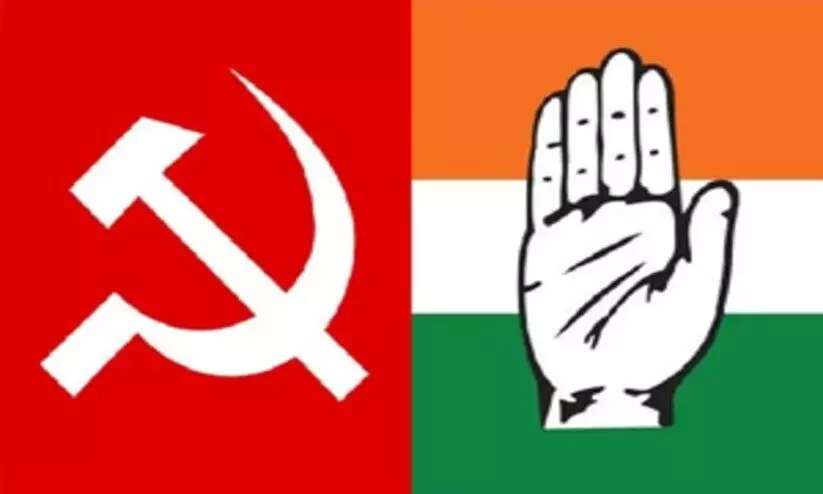
Left-Cong unite for LS polls in Tripura against BJP for 1st time in 7 decades
text_fieldsAgartala: For the first time in the 72-year electoral history of Tripura, the Left parties and the Congress are contesting together in the parliamentary polls to take on the BJP, though the two traditional rivals jointly fought against the ruling party in last year’s Assembly elections.
In the high-profile Tripura West Lok Sabha seat, the main contest will be between the BJP nominee and former Tripura Chief Minister, Biplab Kumar Deb and state Congress President, Ashish Kumar Saha, who is a common candidate of the INDIA bloc.
In fact, Congress President Saha and sitting Congress MLA, Sudip Roy Barman quit the BJP in February 2022 after being elected to the state Assembly on the party’s tickets in March 2018.
The BJP came to power in Tripura for the first time, delivering a humiliating defeat to the CPI(M)-led Left Front after 25 years.
In last year’s Assembly polls, Saha and Barman contested as Congress nominees against the BJP but the former failed to win, though the latter retained his seat.
Deb, who on May 14, 2022, resigned from the Chief Minister’s post on the direction of the BJP’s central leaders, had in May 2019 removed Barman from his Council of Ministers after a long internal feud.
Significantly, since 1952 the Left Front has been contesting each election against the Congress, which came to power in Tripura last time in 1988 after defeating the Left parties.
In last year’s Assembly polls, the Left Front, which contested the Assembly elections in a seat-sharing arrangement with the Congress, won 11 seats while the grand old party secured only three seats.
Of Tripura’s two Lok Sabha seats -- Tripura West and Tripura East – the electoral focus was always on the Tripura West Lok Sabha seat, which was won by the CPI(M) 11 times since 1952.
The Congress won the seat four times in 1957, 1967, 1989 and 1991.
After the BJP, in alliance with the Indigenous People's Front of Tripura (IPFT) came to power in 2018, the BJP nominee and Central minister Pratima Bhowmik for the first time won the Tripura West Lok Sabha seat in 2019.
This time the BJP dropped Bhowmik and fielded Deb, currently a Rajya Sabha member.
Voters belonging to the tribal and Scheduled Caste communities play a vital role in the electoral politics of Tripura. Of the 60 Assembly seats, 30 each fall in Tripura West and Tripura East Lok Sabha seats.
Of the total 60 seats, 20 seats are reserved for the tribals and 10 are reserved for the Scheduled Caste community.
Of the 30 Assembly constituencies that fall in the Tripura West Lok Sabha seat, seven are reserved for the tribals and five for the Scheduled Castes.
In last year’s Assembly polls, the CPI(M) could not secure any tribal reserve seats out of 20, though the Left party has had a strong base among the tribals since 1952.
The party, however, bagged three Scheduled Caste reserve seats out of 10. The Tipra Motha Party (TMP), which joined the BJP-led government on March 7 would be expected to facilitate the BJP in securing tribal votes.
The TMP, which came to the forefront after capturing the politically important Tripura Tribal Areas Autonomous District Council (TTAADC) in April 2021, pushed the CPI(M) and the Congress into third and fourth positions, respectively, in last year’s Assembly elections.
In the 2023 Assembly polls, the TMP for the first time contested 42 seats on its own and emerged as the second-largest party after the ruling BJP, securing 13 seats out of the total 20 tribal reserve seats.
The BJP won 32 seats, including six tribal reserve seats, while its ally IPFT got one seat. The BJP also managed vital seven Scheduled Caste reserve seats in last year’s Assembly polls.
In the 2018 Assembly polls, the BJP had won 36 seats, including 10 tribal reserve seats, while its ally IPFT bagged eight tribal reserve seats. The CPI(M) had secured 16 seats, including two tribal reserve seats in the 2018 Assembly elections.
The TMP, since 2021, has been demanding the elevation of the TTAADC areas by granting a ‘Greater Tipraland State’ or a separate state for the tribals under Articles 2 and 3 of the Constitution.
This has enabled it to garner the support of the tribals, who constitute one-third of Tripura's little over four million population.
The party, in support of its demands, organised agitations both in the state and in the national Capital.
Political commentator Sekhar Datta said that Left parties’ including the CPI(M) massive voter base erosion among the tribals and Scheduled Caste community caused their defeats in successive elections since 2018.
“Besides the organisational decline, the leadership crisis and the anti- incumbency factors are still continuing as the Left Front was in power in Tripura from 1978 to 1988 and then from 1993-2018. With new faces, they have to rebuild the organisations, both among the tribals and the non-tribals to face the challenge of the BJP,” Datta said.
With inputs from IANS






















